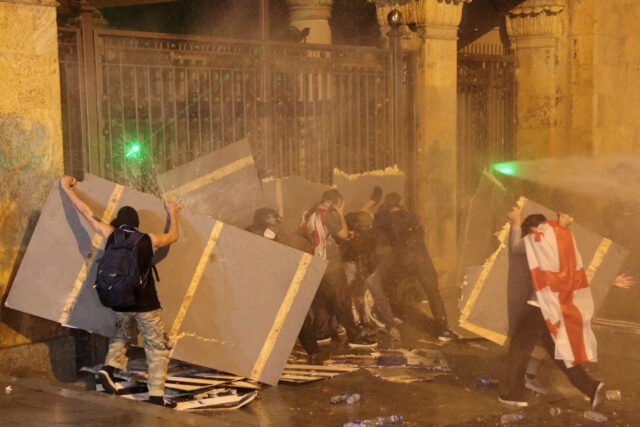Mass protests have continued on the streets of Georgia as the government comes close to passing a “foreign agents” bill.
The draft bill says that NGOs and media outlets that receive more than 20 percent of their funding must be registered as those reflecting the interests of a foreign power. Fines for those who do not implement the bill can range upwards of $9,000.
The bill has attracted furious criticism, and critics have likened it as similar to the one Russian President Vladimir Putin passed in 2012. They say it will stifle dissent, and freedom of the press.
Already, there have been mass protests against the bill, which have been going on for almost a month. This comes as Georgia has bid for membership of the European Union, which granted it candidate status in December.
The US has come down heavily on the Georgian government for seeking to pass the “Kremlin-inspired” bill. US State Department spokesperson Matthew Miller said, “The statements and actions of the Georgian government are incompatible with the democratic values that underpin membership in the EU and NATO and thus jeopardize Georgia’s path to Euro-Atlantic integration.”
In response, Georgia’s prime minister Irakli Kobakhidze, head of the majority Georgian Dream Party, stated in a lengthy post on X that this rule was necessary to crack down on possible US-inspired revolutions in the country.
Stating that he had spoken to US Counsellor of the Department of State Derek Chollet, Kobakhidze said he expressed his “sincere disappointment with the two revolution attempts of 2020-2023 supported by the former US Ambassador and those carried out through NGOs financed from external sources. Had these attempts been successful, the second front line would have been opened in Georgia.”
Though Georgia and the US have enjoyed cordial relations, Kobakhidze, who is head of the Georgian Dream party, has favoured a more conciliatory approach towards Moscow.
He caused anger among the West when he stated that Georgia would not impose sanctions on Russia. He added that Georgia would ensure that its territory was not used to circumvent international sanctions either.
Kobakhidze is determined to pass the bill for which the first draft was introduced on April 17. The bill is meeting with fierce resistance from Georgia’s president Salome Zourabichvili.
Though Georgia follows a parliamentary system where the president’s role is ceremonial Zourabichvili’s veto could certainly create problems for the government.
(With inputs from agencies)
Traveller, bibliophile and wordsmith with a yen for international relations. A journalist and budding author of short fiction, life is a daily struggle to uncover the latest breaking story while attempting to be Hemingway in the self-same time. Focussed especially on Europe and West Asia, discussing Brexit, the Iran crisis and all matters related is a passion that endures to this day. Believes firmly that life without the written word is a life best not lived. That’s me, Ashwin Ahmad.





